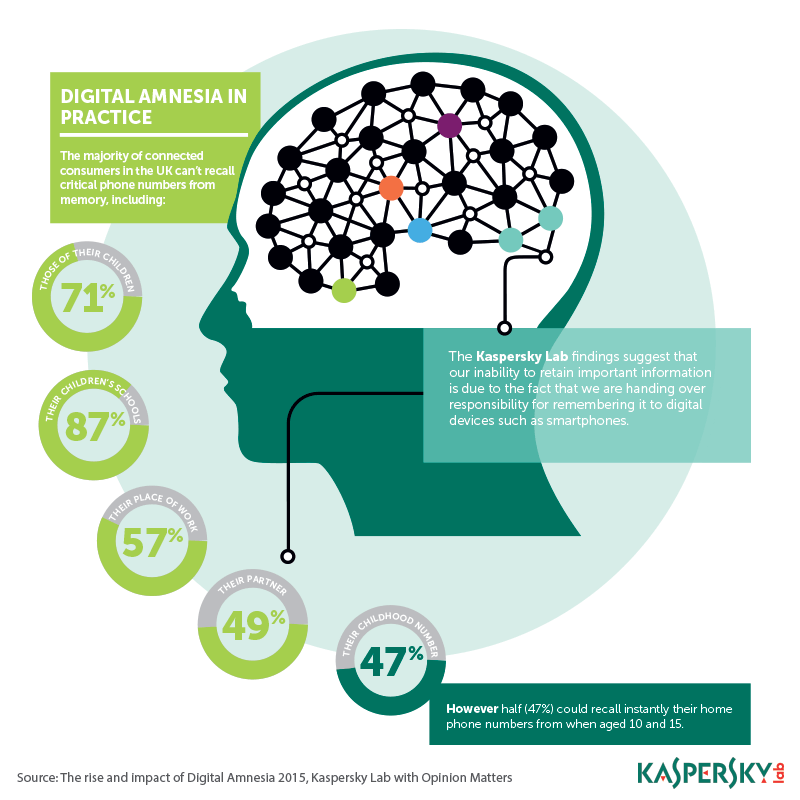The "Google Effect", i.e. the effect it has on μνήμη us the ability to find information on the Internet[I], has expanded to reach important personal information as well as mobile devices, according to new Kaspersky Lab research.  The study reveals that most "interconnected consumers" in Europe can not recall important telephone numbers such as their 53%, 90% and 51% of their children (XNUMX% ).
The study reveals that most "interconnected consumers" in Europe can not recall important telephone numbers such as their 53%, 90% and 51% of their children (XNUMX% ).
In addition, about a third could not remember his partner's number, while four out of ten said they had forgotten their home phone number at the age of 10-15 years.
Kaspersky Lab surveyed 6.000 consumers aged 16 years and over six European countries.
These findings show that our inability to remember important information is due to the fact that we have handed over the responsibility for managing information on digital devices such as smartphones.
Almost half (43%) of the younger surveyed consumers (16-24 years) say that their smartphone stores almost everything they need to know or remember.
Kaspersky Lab calls this phenomenon as "Digital Amnesia" to describe the fact that someone forgets information because they trust a digital device to store and remember them on their behalf.
The study found samples of "Digital Amnesia" in all age groups, both in males and females
Not surprisingly, the investigation revealed that the loss or leakage data stored on digital devices – and smartphones in particular – will cause problems for many users. Four out of ten women, as well as four out of ten respondents in the general population aged 16-24, would feel deeply saddened as they have memories stored on their devices that they believe they could never retrieve. One in four women and as many as one in four younger respondents would be absolutely furious, as their devices are the only place they store images and contact information.
It is therefore worrying that despite the increasing reliance on digital devices, the fact that we treat them as the custodian of our memories, and despite the profound emotional impact of losing those memories, the survey found that European consumers are not protecting adequately these devices with technology security. The protection of smartphones and tablets is particularly lacking. Only one in three (36%) install an additional security solution on their smartphone and only about a quarter (23%) install a security solution on their tablet.
One in five users (21%) does not protect any of its devices with additional security.
"Interconnected devices enrich our lives, but at the same time have contributed to the emergence of so-called" Digital Amnesia ". We need to understand the long-term impact that this has on how we remember, but also how to protect these memories.
The phone numbers that are important to each one of us are now just a click away. So we no longer make any effort to memorize details. In addition, an overwhelming 86% of respondents said that in the modern interconnected world, people are simply invited to remember too many numbers, addresses and obligations - something they find impractical, even if they wish.
We have discovered that the possible loss or leakage of this valuable information will not only be a nuisance, but will leave many people deeply embarrassed. Kaspersky Lab is committed to helping people understand the risks to which their data could be exposed, and to offer them the ability to address these risks.
For example, this can be done by installing software security, which will keep devices and their data protected,” said David Emm, Principal Security Researcher at Kaspersky Lab.
More information is available in the analytical report, entitled “The rise and impact of Digital Amnesia: Why we need to protect what we no longer remember".





